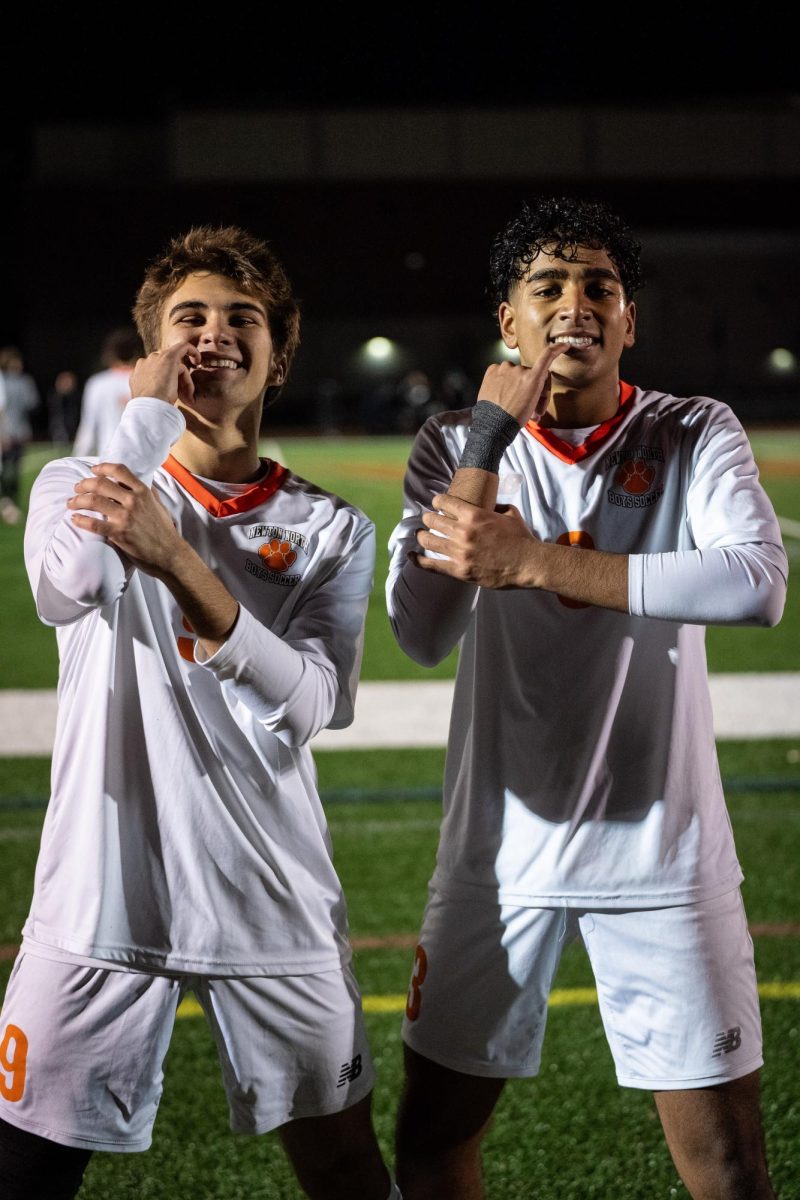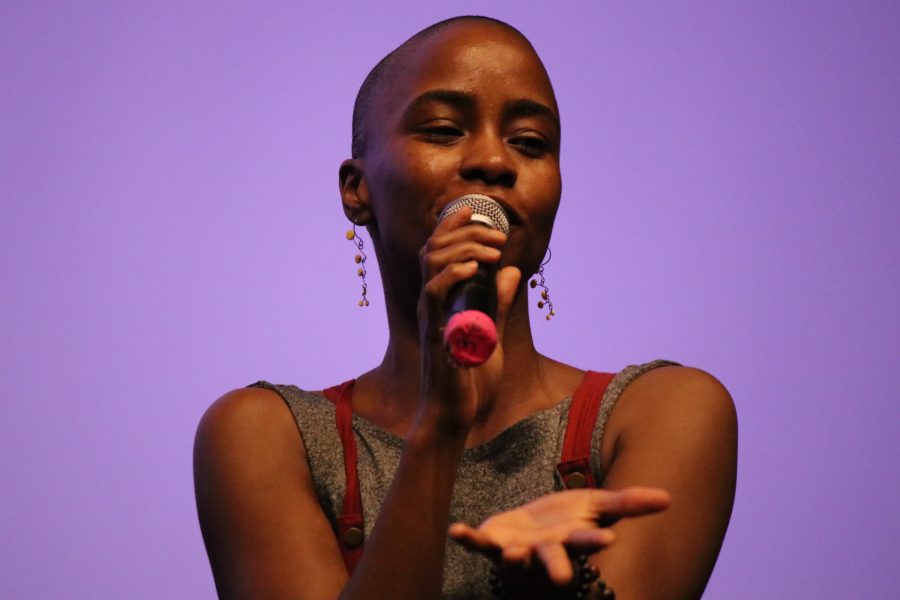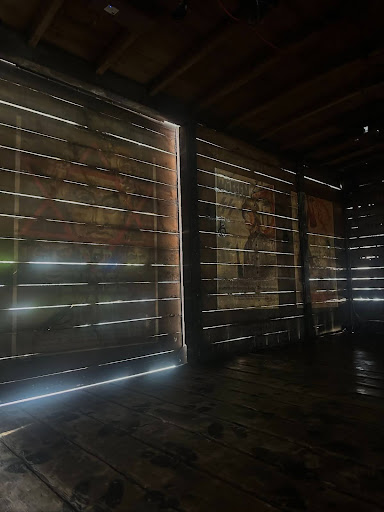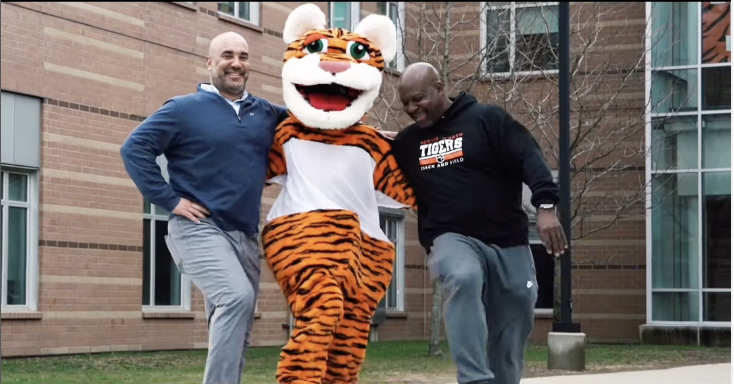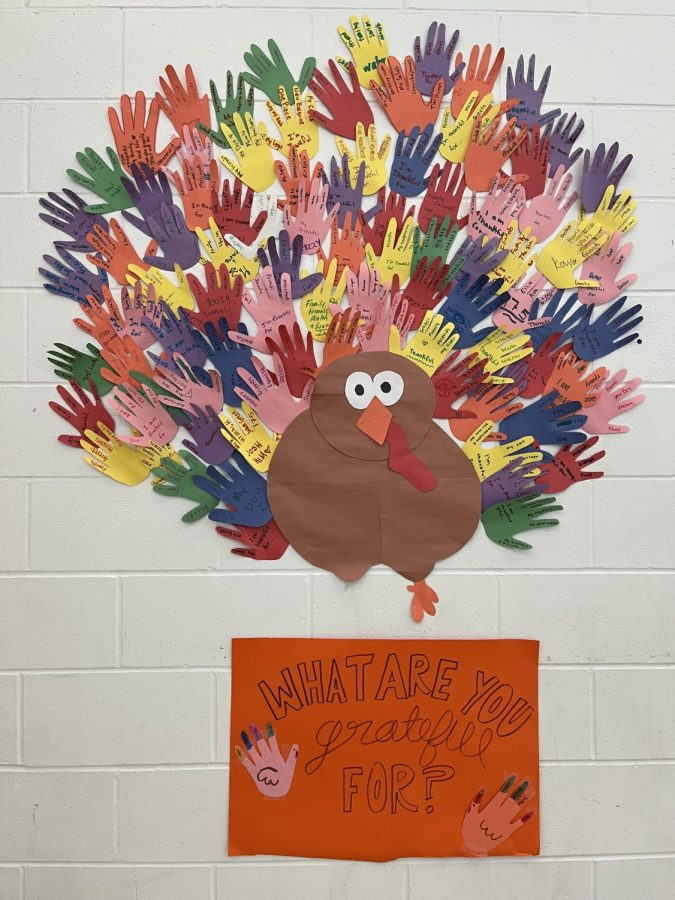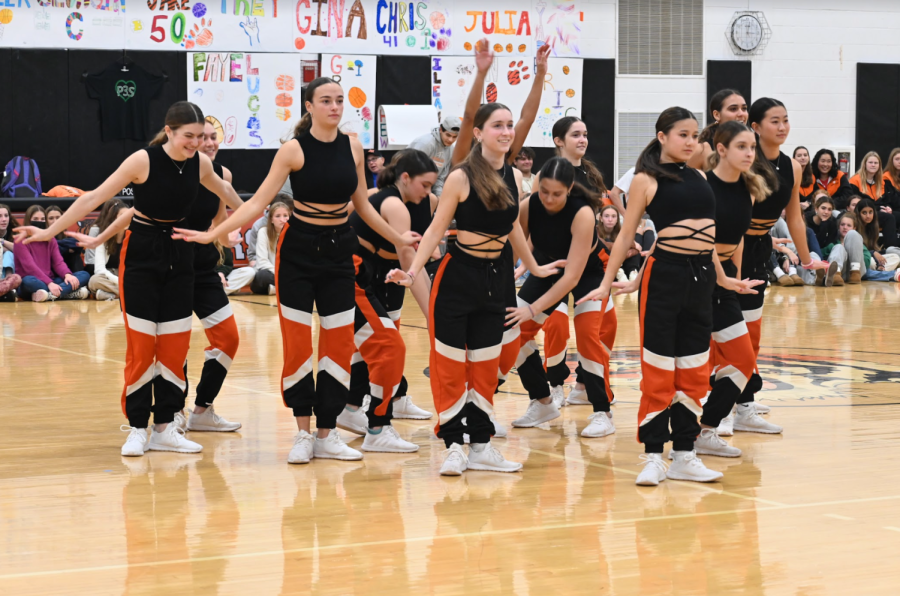A-block
by Laura Schmidt-Hong
Professional standup comedian Pamela Schuller spoke about her experiences with Tourette’s syndrome and what it taught her about inclusion and accepting her own differences as part of Kindness Day last Friday during A-block in the auditorium.
Schuller began by describing Tourette’s, a neurological disorder characterized by a lack of control over one’s own movements and sounds. She used a metaphor to explain it, saying that if her brain were a fence, there would be “a piece missing,” through which unwanted signals could “seep through,” resulting in certain tics such as winks or barks.
She explained that at one point during her childhood, she had the worst documented case of Tourette’s in the country. “Basically, my body didn’t match my brain,” she said.
As a result of her Tourette’s, Schuller said, “I felt like people started treating me differently.” She told many stories of her experiences with Tourette’s and how they impacted her self-esteem and her relationships with other people, including both her fellow students and her teachers, using these anecdotes to paint a picture of her early life.
“It had been years of me feeling like I was different in a bad way,” she noted. “It wasn’t just a part of my belief system that I was a waste of space. It was my entire belief system.”
Schuller decided to enroll in her boarding school’s standup comedy and improvisation class, which she soon realized provided her with “something to hold onto to pull myself out of feeling worthless.” She explained that she finally appreciated something about herself: her sense of humor.
“When you get onstage to do improv, you get to be yourself,” she added. “When I’m on stage, I learn my brain is witty and funny, and it also has Tourette’s.”
Schuller decided to become a standup comedian after taking the improvisation class, explaining, “During the moments on stage when I’m unapologetically myself, the energy is incredible.
“We’re creating this society where it’s hush to be different,” she said. “It’s cliché, but you matter. Your differences are what will change the world.”
“Being kind is good,” Schuller added, “but celebrating differences is better.”
She concluded the presentation by saying, “I will always have a disability. That doesn’t make me less than. That makes me different.”
C-block
by Tali Falk-Judson
Scott Benner and Caitlin Murphy of ArtLifting, a company that sells the art made by homeless and disabled, gave a presentation on their program during C-block last Friday.
Benner, one of the company’s artists, and curatorial associate Murphy spoke about the company’s growth and mission.
“We go to shelters and try to find people who would otherwise have no opportunity to explore their [artistic] talents,” said Murphy. “Then we market their works and give them 55% of the profits.”
ArtLifting was founded in Nov. 2013 by siblings Liz and Spencer Powers, who quickly grew the business, according to Murphy.
“ArtLifting saved my life,” said Benner. “I lost my job where I’d worked my entire life, and after bouncing around for awhile, I ended up in a shelter in Quincy. I thought that was it until I found ArtLifting. I met with Liz, showed her some of my pictures, and now I got a painting sold to Deval Patrick that hangs in his office.”
“We do our best to help people as best we can,” said Murphy. “ArtLifting is a for-profit business, so we can do what we do more efficiently than many of our counterparts.”
“What ArtLifting really provides is hope,” Benner said. “Hope that there is life ahead of you even when you’re in a shelter and down on your luck. It gave me the hope to keep on going with my life. That’s why what it does is so important,” Benner concluded.
E-block
by Sophia Zhou
A five person panel discussed their thoughts and feelings about empathy and compassion during E-Block of Be Kind Day.
The panel consisted of junior Daisy Hutter, sophomore Nathan Persampieri, theater department head Adam Brown, physical education teacher Lauren Baugher, and Maxwell Perry, the founder of Beantown Blankets, a business that gives a blanket to a homeless person for every blanket purchased. The conversation was moderated by special education teacher Rebecca Comiskey.
The presentation kicked off with an introduction about Be Kind Day by math teacher Tracey Stewart, an organizer of the event and advisor to the Partners in Kind club.
She highlighted the importance of kindness, “humaneness,” and the subtle but crucial difference between empathy and sympathy. Whereas sympathy is just about feeling bad for others, empathy is about a deeper connection, an understanding of where people are coming from, according to Stewart.
She then invited everyone to test their empathy skills in a game of Kahoot. Pictures of pairs of eyes were shown on the projector and everyone tried to guess what that person’s emotion was just by looking at their eyes. The top six winners got a t-shirt.
Afterwards, the panel discussion began with the panelists sharing personal experiences with empathy as well as why they think it’s important.
“People all want to be understood,” said Perry. “I think they want to have their emotions understood, and their life that their going through. I think that if you’re able to really talk to somebody and understand what their going through, it’s extremely important for both friends and I’m guessing the workplace.”
Brown added, “Every profession needs empathy because you need to interact with people with empathy.”
Taking note of the current divisiveness among many communities, Persampieri said, “Empathy is important because with all the trouble that’s going on in the world, especially at North, it’s good to find a safe spot to come together every day.”
For Persampieri, empathy is particularly important to him due to the many struggles and challenges he faces as someone with disabilities. He cited the difficulty of finding people to sit with during lunch as an example.
Brown noted that, “I think we’re very quick to look at one another, at times, and say what’s wrong with that person, why are they acting that way?”
He added, “You can’t really walk in someone’s shoes, you really truly can’t, but what’s really important is you try and listen and understand the best you can in terms of where that person is coming from and support them as much as possible.”
In addition to understanding where others are coming from, Hutter said that, “Empathy is also about self care and compassion for yourself.”
Persampieri added, “You have to take care of yourself before you take care of others.”
When asked about whether or not empathy could be taught, the panelists all agreed that everyone is largely influenced by their home life, but it’s still possible to learn empathy outside of home.
“I believe that kids are born a blank slate,” said Baugher, “how they treat others is a direct reflection of their environment.”
According to Brown, the environment one grows up in sets the foundation for empathy. Growing up in a “dysfunctional” family, he explained that he never wanted to be home, instead devoted himself to sports, theater, and avoiding home. He said being able to interact and connect with others through sports and theater provided a release for him and taught him the importance of friendship.
Stewart closed the discussion by recapping the purpose of Be Kind Day and reminding everyone to be empathetic.
“You should be kind at all times, and this is really just a day to celebrate who we are, how good we are, and how we’re connecting with everybody,” she said.
G-block
by Rose Skylstad
“When we are willing to reach out from our hearts with a genuine desire to connect, we have almost unlimited potential to positively affect the people and situations around us,” said Sarah Livesey in her G-block presentation about the lessons she has learned from her struggle with brain cancer for Kindness Day last Friday.
Livesey shared her story with a short film called “Grace & Gratitude,” which explains how her life changed “in the space of two minutes.” Livesey was, and still is, asymptomatic, meaning she displays no signs of illness, and her cancer was only discovered after she fainted and incurred significant head injuries from the fall.
“Being diagnosed with an incurable disease is something that cracks you wide open,” said Livesey.
The diagnoses, she said, forced her to examine her own life and “take full advantage of life’s everyday lessons, while never losing sight of the blessing that is everyday life.”
Despite the aggressive nature of her cancer, and the large size tumor, Livesey said she has been “living happily and healthily” since her diagnoses.
Livesey also explained the importance and value of spreading kindness that she discovered through her cancer. “I consider myself inordinately blessed, and my focus now is how I can give back by sharing whatever parts of my story might be helpful to others,” she said.
Additionally, Livesey said that kindness can be personally rewarding and leads to a better society as a whole. “When we help others, we help ourselves, and that’s the only way to do this thing called life. Not separate, not alone, not either or. And. Both. Together.”
Livesey ended her speech emphasizing the distinction between the adjectives “nice” and “kind.”
“While I’m sure most people would describe me as a ‘nice’ person, I’m not really interested in nice,” she said. “Nice feels passive, insipid, even like a pushover, possibly. I’m much more invested in being kind, which feels like it requires you to tune in, pay attention, and apply yourself to the task of connecting with another.”
F-block
by Maya Waldman
Singer-songwriter Shea Rose discussed music as a form of philanthropy as a part of Kindness Day F-block in the auditorium.
Rose described the importance of using one’s voice positively, whether it be through music, literature, or public speaking events.
“Music in particular allows us to communicate in a way that’s very unique,” she said.
To begin her presentation, Rose asked that everyone in the audience stand up and dance to the sound of Ed Sheeran’s “Castle on the Hill”, in order to “get everyone on the same vibration.”
A graduate from Berklee College of Music, Rose was featured on two Grammy award-winning albums and got the chance to meet Queen Latifah.
Despite all of her success, she soon “hit a wall” when she had to get vocal chord surgery at the age of 34.
“I wasn’t being nice to my voice, and I wasn’t being kind with it either,” Rose said. She explained that she had often yelled at band members and belted songs too loudly.
Another low point was when she got an offer from a big-label record producer, and lied about her age, claiming that she was nearly ten years younger than her actual age was at the time, just to get the job.
“That was sort of my breaking point,” said Rose about the situation. “I realized that I was so focused on success that I had lost even the most basic values, like honesty.”
According to Rose, her biggest fear about refusing the record deal was being shunned by the music industry. However, that was not the case: “Thankfully, the executive at the record company was very kind and gave me ample time to make my decision. When I finally turned down the offer, he was supportive.”
Today, Rose works as a music curator at the Isabella Stewart Gardner Museum. The way one chooses to use their voice makes a world of difference, she said.
“Words do matter,” said Rose. “Use them kindly.”
Kindness Day presenters share inspiring stories, emphasize generosity
May 8, 2017
Donate to The Newtonite
More to Discover













